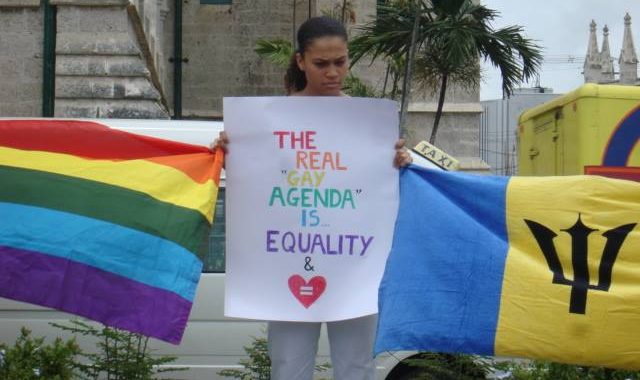Barbados: Why delay LGBTI workplace bias law? (2nd of 2)
Colin Stewart is a 45-year journalism veteran living in Southern…
Delays and omissions have marred Barbados legislators’ tentative steps toward solving the problem of employers’ bias against LGBTI workers.
COMMENTARY
This is the second in a two-part series about the need to improve workplace protections for LGBTI people in Barbados. The first article in the series is “Barbados: Why delay LGBTI workplace bias law?”

By Alexa D.V. Hoffmann
Many months of inaction have elapsed since parliament was first presented a bill to address the shortfalls of Barbadian protections for LGBTI people in the workplace.
When discussions about that proposal began late last year, people expected the new law to protect against bias on the basis of sexual orientation. At the time, discrimination on the basis of gender identity and expression was not mentioned. People also expected that such a law would prevent discriminatory hiring and recruitment practices, thus allowing a fair and equal opportunity for LGBTI people to be considered for employment.
On Feb. 4, 2020, the Employment (Prevention of Discrimination) Bill 2020 (EPDB) was presented to parliament. True to the word circulating the year prior, the EPDB does seek to prevent discrimination on the basis of sexual orientation. It also would revise the description of some other prohibited grounds for termination that were outlined in the Employment RIghts Act (ERA) of 2012. For example, bias against workers with HIV/AIDS and other life-threatening illnesses are simply covered by a prohibition on bias based on a worker’s “medical condition”.
It would also outlaw discrimination in employment advertising and in the vetting processes to determine suitable candidates for a given job, unless the employer is filling a job in which only individuals of a particular sex would be suitable.
The EPDB would also allow employees to appeal to the Employment Rights Tribunal, which was established under the ERA, if they had lodged a formal complaint of discrimination with their employer but it was not adequately addressed.
The EPDB apparently would also eliminate the ERA’s one-year “fair game” waiting period before a new employee has the right not to be unfairly terminated.
While LGBI employees could breathe a sigh of relief should the law be passed as it is, two major problems remain.
Firstly, the EPDB should expressly protect trans, non-binary and gender non-conforming individuals from discrimination, but the current version does not.
If the law were enacted as is, individuals like myself would have to play semantics or jump through hoops in order to claim protection from discrimination — for example, by asserting that a transphobic employer was discriminating against a “medical condition”. (Transgenderism and transsexualism are recognized medical and psychological conditions.)
The second problem with the EPDB is simply that, despite almost six months having passed since the bill was first presented, there has been virtually no discussion on the matter. It has yet to go through its three readings at the House of Assembly and the three more readings at the Senate before it can be passed.

For me, even acknowledging the challenges brought about by the pandemic and the lockdown, this length of delay is disturbing, especially in contrast with the urgent efforts that were made to push matters such as the Welcome Stamp programme through parliament.
As we say in Barbados, “home drums beat first,” meaning that before looking at any dealings concerning external entities, one must ensure that everything is in order in your immediate surroundings – your home as it were. Efforts are being made to encourage “all” individuals who wish to live and work in Barbados, yet the lives and jobs of LGBTI Barbadians have been put on a back-burner.
Indeed, if Prime Minister Mia Mottley and the wider Government of Barbados wish to prove that her words that “All are Welcome” are not merely empty vocalisations designed to encourage inbound flights of foreign nationals with swollen wallets, they now must show a genuine sense of urgency to ensure that all of its citizens who are already here can live their lives fully and freely.
That includes repealing the onerous provisions of the Sexual Offences Act, which targets same-sex intimacy. It also includes fixing and then passing the now-languishing EPDB so Barbados will finally protect all LGBTI individuals, whether natives or newcomers, who enter the Barbadian workforce.
To prove the truth of the prime minister’s words that Barbados has “something very special to offer” and is “an ideal place to live,” she needs to demonstrate not only that new workers will be welcomed at the border with open arms, but that the arms of the law will protect both them and every Barbadian citizen whether they are at home, on the street or at work.
The second article in this series is “Barbados: Why delay LGBTI workplace bias law?”
Related articles:
- Barbados: Why delay LGBTI workplace bias law? (1st of 2) (July 2020, 76crimes.com)
- Barbados: Come for the beaches, stay for the life sentence (July 2020, 76crimes.com)
- A Barbados welcome for everyone but LGBTQ couples (July 2020, 76crimes.com)
- Three betrayals by three powerful Caribbean women (July 2020, 76crimes.com)
- This blog’s archive of articles by and about Alexa D.V. Hoffmann.

Barbadian trans advocate Alexa D. V. Hoffmann is the founding director of Trans Advocacy & Agitation Barbados (TAAB), chairwoman of the United Caribbean Trans Network (UCTRANS) and a member of the Latin American and Caribbean Network of Trans Persons (RedLacTrans). In 2018, she and two other Barbadian activists launched a legal challenge against the nation’s anti-sodomy law. She also manages the Rainbow Caribbean page on Facebook.




Barbados allows anti-LGBTI bias in the workplace (1st of 2)